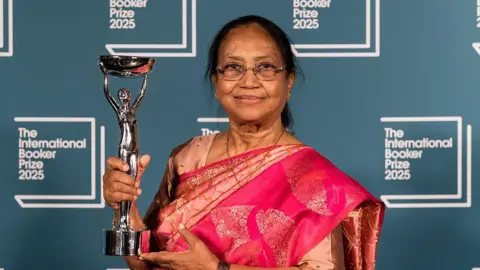Mushtaq was born and raised in a small town in Karnataka's Muslim community, where her father’s desire for her education led her to a convent school with a Kannada curriculum. Her journey as a writer began in school, despite societal expectations to marry young. After marrying at 26, Mushtaq faced immense pressure and isolation, eventually leading to her life-altering decision to pursue her passion for writing, even amidst personal turmoil, including struggles with postpartum depression.
"Heart Lamp" illustrates the resilience and complexity of its female characters, who navigate the constraints of their culture with strength and determination. Mushtaq's work diverges from mainstream narratives that often present Muslim women as mere tropes in broader moral discussions. Reviews highlight Mushtaq's unique voice that articulates the quiet yet formidable power of these women’s realities.
Throughout her career, Mushtaq has not only excelled as a writer but has also faced significant backlash, including threats following her advocacy for women's rights in religious spaces. Despite the turmoil, she remains an unwavering voice for social justice through both her storytelling and her work as an activist.
Her literary achievements, including multiple local awards and recognition, further amplify the relevance of her narratives. In 2024, her translated collection "Haseena and Other Stories" garnered the PEN Translation Prize, solidifying her place in the literary landscape.
As Mushtaq celebrates this monumental victory, her work continues to inspire discussions around gender, faith, and identity in contemporary India.
"Heart Lamp" illustrates the resilience and complexity of its female characters, who navigate the constraints of their culture with strength and determination. Mushtaq's work diverges from mainstream narratives that often present Muslim women as mere tropes in broader moral discussions. Reviews highlight Mushtaq's unique voice that articulates the quiet yet formidable power of these women’s realities.
Throughout her career, Mushtaq has not only excelled as a writer but has also faced significant backlash, including threats following her advocacy for women's rights in religious spaces. Despite the turmoil, she remains an unwavering voice for social justice through both her storytelling and her work as an activist.
Her literary achievements, including multiple local awards and recognition, further amplify the relevance of her narratives. In 2024, her translated collection "Haseena and Other Stories" garnered the PEN Translation Prize, solidifying her place in the literary landscape.
As Mushtaq celebrates this monumental victory, her work continues to inspire discussions around gender, faith, and identity in contemporary India.

















